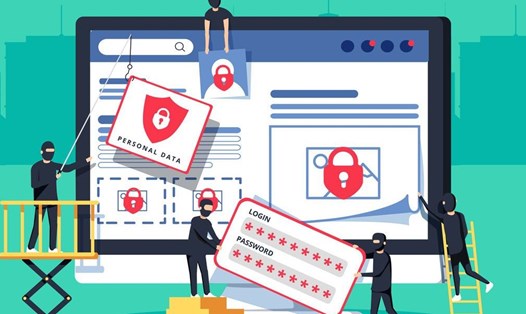Just in a flash, from surfing social networks or checking email, you can fall into scams, lose money, and leak personal information without knowing it.
2025 will witness a strong increase in sophisticated online scams, targeting users' psychology with increasingly difficult tricks to detect.
Here are the 8 most popular tricks you need to know to protect yourself:
1. Online fraud
E-mails or warning messages of "unusual logins" from banks, asking for "account verification" by clicking on fake links are a way for criminals to steal information. Any subsequent actions can result in you losing control of your account.
2. identity verification fraud
Some websites require verifying that you are not a robot but then lure you to run a command or paste the code into the device. These seemingly harmless operations can install malware into the device.
3. Fraudulent impersonation of state agencies/organization
Fraudsters impersonate bank employees, company IT or law enforcement agencies to defraud OTP and passwords. Some cases even call impersonating police to threaten and demand money transfers to "resolve the matter".
4. Employment fraud
built-in text messages recruiting people to work at home with attractive salaries, but required payment of "registry" fees or providing personal information. After paying the money, they "evaporated" without a trace.
5. holiday and promotion scams
In the midst of the year-end shopping season, fake links announcing late delivery, free gifts or gift cards are being widely used. Users are easily deceived because the interface is very similar to reputable commercial sites.
6. Charity donation scams
After each disaster, fake donation links are rampant on social networks. Organizations such as the Indian Relief Fund were set up to benefit and exploit the communitys compassion.
7. Affection fraud
Users are lured through dating apps, building close relationships and then asking for money for urgent reasons. Deepfake and AI technology also helps scammers create extremely convincing virtual identities.
8. Fraudulently impersonating police or calling for arrest
The calls impersonating police officers, informing you of involvement in a criminal case, and asking for money transfers to "resolve" are breaking out. In particular, the elderly are easily frightened and listen, leading to great damage.
How to protect yourself?
- Always skeptical about strange messages or attractive invitations.
- Do not provide personal information, OTP, password via phone or social networks.
- Do not run strange code or click on suspicious links.
- Use reputable virus terminal software and update the operating system regularly.
- Sharing this knowledge with relatives, especially the elderly and children.











